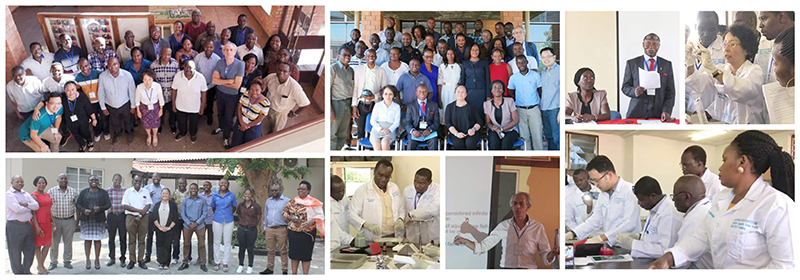
Under the project UTF/ZAM/077/ZAM: Zambia Aquaculture Enterprise Development Project (ZAEDP) funded by the African Development Bank, three back-to-back events related to Output 4, held from 11-17 October 2019, in Lusaka, were successfully concluded.
Event 1 (11-12 October) paved the way for the establishment of a Committee on Aquatic Animal Health with 4 major tasks: (1) development of a National Strategy on Aquatic Animal Health; (2) provision of technical oversight in the implementation of Output 4 of ZAEDP; (3) provision of high level technical advice to the Ministry of Fisheries and Livestock (MFL) on aquaculture biosecurity (AB) issues; and (4) ensuring that aquaculture biosecurity is positioned and captured in key events and important policy documents.
Event 2 (14-17 October) in collaboration with University of Zambia,  trained some 28 personnel representing the MFL, Department of National Parks and Wildlife, producers, and research/academic institutions on the design and implementation of an active surveillance for two important fish diseases, i.e. Epizootic ulcerative syndrome (EUS) and Tilapia lake virus (TiLV). The knowledge gained on basic aquatic animal health, diagnostics, and surveillance will enable them to draw appropriate prevention and disease management measures based on EUS and TiLV status  in the country that will be determined through a systematic and practical approach using the FAO 12-point surveillance checklist developed for field application by non-specialists (i.e. those with no formal training on epidemiology). Local experts (Prof B Mudenda and Dr M Songe) and FAO experts (Dr K Tang-Nelson, Prof N Fejzic, Dr W Surachetpong and Dr M Reantaso) delivered the course.
Event 3 (17 October) provided vital information about ZAEDP and generated ideas for Output 4 that are planned to be incorporated in the project implementation. The 28 participants representing various aquaculture players in the value chain engaged in a very dynamic exchange of ideas and experiences.
Over-all the three events created a promising environment that will address one of the most important sustainability challenges of the aquaculture sector. Biosecurity capacity and systems need to be parallel in any aquaculture development.
It is well known that the Zambian President Edgar Lungu has “a heart for aquaculture”. FAO strongly supports Zambian aspiration for a sustainable aquaculture through improving biosecurity.
Further information on Output 4 of this project can be obtained in writing: Melba.Reantaso@fao.org